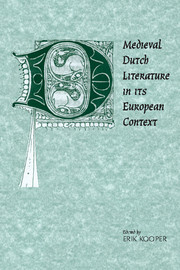Book contents
- Frontmatter
- Contents
- List of contributors
- Preface
- Map
- Introduction
- PART I COURT AND CITY
- PART II THE WORLD OF CHIVALRY
- 5 Middle Dutch Charlemagne romances and the oral tradition of the chansons de geste
- 6 The prologue to Arturs doet, the Middle Dutch translation of La Mort le Roi Artu in the Lancelot Compilation
- 7 The Roman van Walewein, an episodic Arthurian romance
- PART III REYNARD THE FOX
- PART IV THE LITERATURE OF LOVE
- PART V RELIGIOUS LITERATURE
- PART VI ARTES TEXTS
- PART VII DRAMA
- Appendix A Bibliography of translations
- Appendix B Chronological table
- Index
5 - Middle Dutch Charlemagne romances and the oral tradition of the chansons de geste
Published online by Cambridge University Press: 13 October 2009
- Frontmatter
- Contents
- List of contributors
- Preface
- Map
- Introduction
- PART I COURT AND CITY
- PART II THE WORLD OF CHIVALRY
- 5 Middle Dutch Charlemagne romances and the oral tradition of the chansons de geste
- 6 The prologue to Arturs doet, the Middle Dutch translation of La Mort le Roi Artu in the Lancelot Compilation
- 7 The Roman van Walewein, an episodic Arthurian romance
- PART III REYNARD THE FOX
- PART IV THE LITERATURE OF LOVE
- PART V RELIGIOUS LITERATURE
- PART VI ARTES TEXTS
- PART VII DRAMA
- Appendix A Bibliography of translations
- Appendix B Chronological table
- Index
Summary
In the period between 1280 and 1290, the Flemish poet Jacob van Maerlant (commissioned by Count Florens V of Holland) produced a Middle Dutch translation of Vincent of Beauvais' Speculum historiale in rhyming couplets. Although Maerlant generally followed his source quite closely, he did not hesitate to depart from the Speculum where he considered this necessary. He adds, for instance, several passages to the part that is devoted to the life and times of Charlemagne. For this study of Middle Dutch Charlemagne romances, one of these additions is of particular importance: the chapter in which Maerlant deals with professional storytellers.
In this chapter, which is entitled ‘tscelden jegen die borderers’ (the scoffing at those who invent stories) and which consists of 82 lines, those who recite stories on Charlemagne are severely criticized. Maerlant reproaches them for telling lies, as they spoil the true stories with fancy words and melodious rhymes (lines 2–3: ‘Die vraye ystorien vermorden / Met sconen rime, met scoenre tale’). Since the words sound pleasing and the subject is attractive, they claim their stories to be true (lines 3–6: ‘Omdat die worde luden wale, / Entie materie es scone ende claer, / So doen sise verstaen vor waer’). Maerlant describes these storytellers as unreliable French poets, who rhyme at random, though with virtuosity. (‘Die scone Walsche valsche poeten, / Die meer rimen dan si weten’, lines 27–8). He also specifies the stories he has in mind.
- Type
- Chapter
- Information
- Medieval Dutch Literature in its European Context , pp. 81 - 95Publisher: Cambridge University PressPrint publication year: 1994



